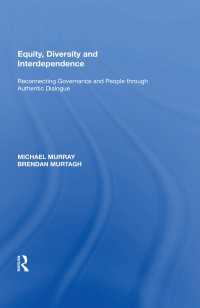- ホーム
- > 洋書
- > 英文書
- > Philosophy
Full Description
A Logical Introduction to Probability and Induction is a textbook on the mathematics of the probability calculus and its applications in philosophy.
On the mathematical side, the textbook introduces these parts of logic and set theory that are needed for a precise formulation of the probability calculus. On the philosophical side, the main focus is on the problem of induction and its reception in epistemology and the philosophy of science. Particular emphasis is placed on the means-end approach to the justification of inductive inference rules.
In addition, the book discusses the major interpretations of probability. These are philosophical accounts of the nature of probability that interpret the mathematical structure of the probability calculus. Besides the classical and logical interpretation, they include the interpretation of probability as chance, degree of belief, and relative frequency. The Bayesian interpretation of probability as degree of belief locates probability in a subject's mind. It raises the question why her degrees of belief ought to obey the probability calculus. In contrast to this, chance and relative frequency belong to the external world. While chance is postulated by theory, relative frequencies can be observed empirically.
A Logical Introduction to Probability and Induction aims to equip students with the ability to successfully carry out arguments. It begins with elementary deductive logic and uses it as basis for the material on probability and induction. Throughout the textbook results are carefully proved using the inference rules introduced at the beginning, and students are asked to solve problems in the form of 50 exercises. An instructor's manual contains the solutions to these exercises as well as suggested exam questions.
The book does not presuppose any background in mathematics, although sections 10.3-10.9 on statistics are technically sophisticated and optional. The textbook is suitable for lower level undergraduate courses in philosophy and logic.








